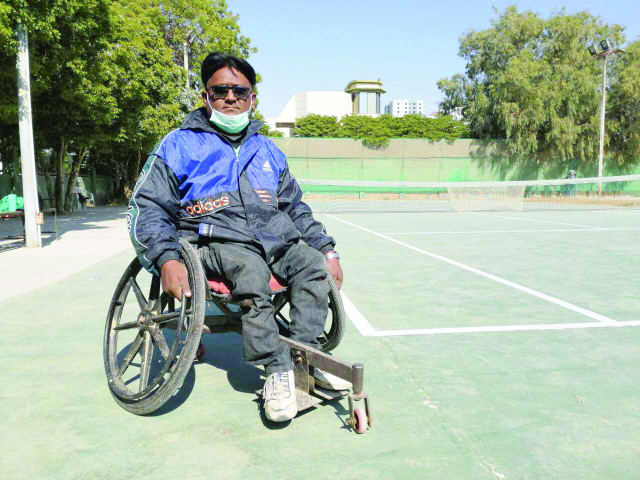Of breaking barriers and mobilising others
A differently-abled sportsperson, Ayub makes wheelchairs to assist other players with physical limitations

Muhammad Ayub contracted polio at the age of one and a half years. Since then, his normal has been different from that of the others - so much so that he has turned it into his strength.
Now 38 years old, the Korangi resident has been actively playing sports for years - from cricket to tennis and even basketball - on a wheelchair he made himself.
“I would often doubt my capabilities when I took to playing sports,” he told The Express Tribune. “I would ask myself whether I would be able to do, but my coaches helped me recognise my potential and I haven’t looked back since then. I decided then that I would set an example for differently-abled persons.”
Having landed a job as a telephone operation in Clifton Board Cantonment, after a long struggle, he is now able to throw himself completely into sports on weekends. And when he is not doing either of the two, his other passion, of making wheelchairs for differently-abled persons, keeps him busy.
His venture into making wheelchairs goes six years back, when he wanted one for himself so that he could easily play cricket. But most wheelchairs for differently-abled persons who wanted to participate in sports were imported, expensive - worth over Rs100,000 - and out of his reach.
So, he made one himself.
The wheelchair was solely designed by Ayub and built with the help of a craftsman in a span of 15 to 20 days. It cost him around Rs7,000.
“I enjoyed playing the sport more while using it,” he said, glee and pride apparent in his voice. “My performance improved significantly.”
After that, he gained confidence in his ability to build more similar wheelchairs to assist other differently-abled sportspersons, and has made 25 others since then. They are being used by cricketers, basketball players and tennis players, 15 of whom are in Ghotki, seven playing for different organisations and one who plays tennis at Union Club.
Willing to continue making such wheelchairs, he, however, is adamant that he doesn’t see it as a means to earn money.
According to Ayub, he is the first person in Pakistan to have made wheelchairs for differently-abled sportspersons for free.
“After I did it, some manufacturers in Lahore and Multan followed suit, but they charge money for it,” he claimed.
It takes him anywhere between a week and 10 days to assemble a wheelchair, which he now does with his brother’s help. “We bend the pipes in line with the design, then we weld them, attach the cushion and send them for painting after assembly,” he elaborated.
Ayub also understands the complexities involved in making wheelchairs for differently-abled sportspersons. “It has to be designed differently for every sport,” he explained.
He also claimed that the wheelchairs he made were better than imported ones, adding, though, that they were six to seven kilogrammes heavier, which was a shortcoming.
“Lighter chairs allow faster movement,” he said, adding that imported wheelchairs were made of material that was lighter and more durable. But he has to use local material, which is lower in quality, due to lack of resources.
“However, if I get the needed support, I too can make wheelchair at par with imported ones,” Ayub believes.
According to Ayub, almost 50 per cent of differently-abled persons in Pakistan are inclined towards sports but remain confined to their homes, unable to realise their capabilities.
“They either don’t get the needed motivation and encouragement from their families or don’t have access to facilities to participate in sports,” he lamented, adding that if their talent was recognised and polished, they could represent Pakistan and their hometowns on many different platforms - something that he himself has achieved.
Thus far, Ayub has represented Karachi in different tournaments and has been regularly playing tennis for the past four years, for which he practices under the supervision of coaches at PECHS Union Club.
Acknowledging his talent, skills and services for differently-abled sportspersons, Pakistan Tennis Federation vice-chairperson and Para-Sports Pakistan president Muhammad Khalid Rehman, for whose organisation Ayub designed a wheelchair, said, “He is not just a very passionate player, but also a great encouragement for other differently-abled sportspersons.”
Published in The Express Tribune, November 30th, 2020.



















COMMENTS
Comments are moderated and generally will be posted if they are on-topic and not abusive.
For more information, please see our Comments FAQ